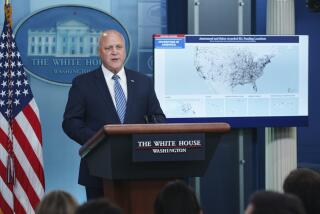A Data Road to Schools : On Summit Eve, Plans for Free Infohighway Hookups
- Share via
Tele-Communications Inc. and Bell Atlantic Corp., which have agreed to merge in a $30-billion deal, on Monday unveiled a plan to hook up 26,000 schools to the coming information superhighway.
The announcement, which came on the eve of the national information highway summit conference to be held today in Los Angeles, appears designed in part to blunt rising government concern that the much-ballyhooed, 500-channel universe will be accessible only to the wealthy.
At the summit on the UCLA campus, Vice President Al Gore is expected to call on an all-star gathering of media and entertainment industry executives to ensure that the rapidly converging cable television and telephone operators provide easy and affordable access to the myriad informational services over their lines.
Among the participants: Time Warner Chairman Gerald R. Levin, Walt Disney Co. Chairman Michael D. Eisner, QVC Network Chief Executive Barry Diller and News Corp. Chairman Rupert Murdoch, in addition to Bell Atlantic Chairman Raymond Smith and TCI Chief Executive John C. Malone.
Cable giant TCI and Bell Atlantic, a regional phone company, said their plan to wire schools with free access to emerging telecommunications services such as the Internet took shape after lawmakers warned them not to let the information highway bypass the less fortunate.
Under the TCI-Bell Atlantic plan, elementary and secondary schools within their widespread service area--about 25% of the schools in the nation--will be given free access to the interactive network that the companies said they would spend $15 billion building over the next five years.
“The information superhighway has the ability to change the way Americans learn,” Smith said. “The social benefits of this system can be profound.”
But to what extent the access to TCI and Bell Atlantic’s “full-service network” will actually be free remained unclear. TCI and Bell Atlantic officials said that, while access may be free, usage may not.
For example, students may not be charged to send electronic mail to their teachers, but many of the educational programs on the network may be accessible only for a fee. Smith and Malone said there are commercial benefits as well as social considerations.
“It’s in our enlightened self-interest to make sure the schools are introduced to this technology,” Malone said. “When a generation of kids learns how to use the stuff, that will drive the rest of our business.”
Malone would not say how much it would cost TCI-Bell Atlantic to wire all the schools but indicated it was a negligible part of its $15-billion plan.
TCI and Bell Atlantic appear to be working hard behind the scenes to quell concern among lawmakers that there will be costly tollbooths along the information superhighway.
In a glitzy, five-city electronic press conference Monday, TCI and Bell Atlantic showed off pilot programs of interactive computers in the classroom, where students were able to conduct lessons from home with their teachers and view each other on a primitive video phone.
The companies already seemed to have won the unbridled enthusiasm of one potential foe.
Rep. Edward Markey (D-Mass.), chairman of the House Telecommunications Subcommittee, via a live video hookup from Boston, hailed the TCI-Bell Atlantic project as “visionary.” A TCI official said a letter last December from Markey prompted the initiative, and he hoped other cable TV and telephone companies would soon follow suit.
While educational programs are frequently trumpeted as one of the benefits from the new technology, there is still no consensus on how the electronic superhighway will be structured, who will own it and how much it will cost.
The past year has seen hundreds of announcements from companies--whether they are mega-mergers, like TCI and Bell Atlantic, or software developments from “garage programmers”--as they jockey to position themselves for what is expected to be one of the biggest economic markets of the next century.
Still unresolved is how the 35% of U.S. households that do not get cable TV will participate in the benefits of the electronic superhighway.
While phone companies are moving ahead to knock down regulatory battles that prohibit them from providing many of the same services offered by cable companies, they are nonetheless expected to resist the kind of regulations that force them to serve low-income and rural customers at a loss.
* INFORMATION HIGHWAY
Government, industry seek ways to give the poor access. A1
* VIDEO WIRING
US West to spend $750 million on telephone service. D2
More to Read
Inside the business of entertainment
The Wide Shot brings you news, analysis and insights on everything from streaming wars to production — and what it all means for the future.
You may occasionally receive promotional content from the Los Angeles Times.










